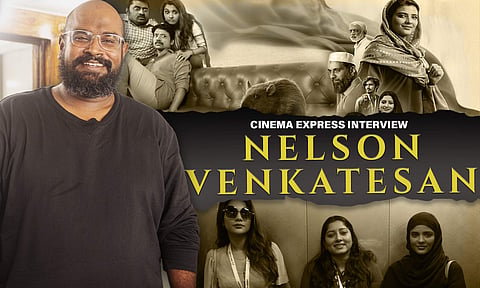

In Darlings, Alia Bhatt played a headscarf-clad Muslim woman. However, the conflict didn’t concern her religious identity. In Tamil cinema, however, be it Manisha Koirala’s Shaila Bhanu (Bombay) or Mirnaa’s Najma (Burqa), the battle for love and longing often takes a religious colour. Certain questions then arise. Why don’t we see women of minority groups fight against opponents unrelated to their faith? Why don’t they encounter a problem of womanhood... that isn't just about their faith? For this and many other reasons, Aishwarya Rajesh’s recent film, Farhana, came as a refreshing change.
Directed by Nelson Venkatesan, the film never exploits Farhana’s Islamic background for easy narrative pleasures. The story is about a woman stuck in a patriarchal world of exploitation, who incidentally turns out to be a Muslim. For Nelson, this was important. “We wanted to stay away from clichés in thought, content, and writing. We wanted to hold on to something that is common to an entire society. We believed that the story would work only if the content was relatable, no matter the premise. We felt that this backdrop would give Farhana a unique colour,” says the filmmaker, while also crediting co-writers Ranjith Ravindran and Shankar Dass for delivering his vision.
The first 20-30 minutes of Farhana features authentic world-building, from depicting the household of a Muslim family to the customs and daily life of Farhana’s family that runs a footwear store. Nelson recalls director Ram saying that a creator’s life depends on the days he doesn’t go for shooting, and not the other way round. “I am keen on having a life and observing when I am not writing/shooting. That life matters so much for my writing,” says Nelson, who brings to life the hustle and bustle of Royapettah, Pudupettai, and Ice House in Farhana. As he lived in those areas, he felt the urge to get the depiction of those arresting visuals just right. “Initially, I had a separate story of a girl getting stuck at a call centre and the lifeline she gets, but placing the narrative in this setup helped add intricate layers to the plot,” he adds.
While Aishwarya Rajesh captivates the audience as Farhana, she is ably supported by the other cast members, including the unapologetic Nithya (Anumol) and Sophie (Aishwarya Dutta), her progressive husband Karim (Jithan Ramesh), and the old-school patriarchal father (Kittu). “Without all of them, you just don’t have the gears to move ahead with the story. They make it all more credible by representing the outside world. They show the society Farhana lives in, and I feel that representation is important,” Nelson explains.
If his previous feature, Monster, had a rat playing a troublemaker, Farhana has Selvaraghavan’s Dhayalan, who comes in shades of grey. However, be it the rat or Dhayalan, Nelson ensures that these antagonistic characters are written with compassion too. “This compassion makes them... real. Antagonists don't come from different planets, and neither are they one-dimensional. I don’t believe in writing vanilla characters.”
Speaking of crafting Dayalan, a troubled man who enjoys silence and music but at the same time has a capacity for vengeance, Nelson explains, “From his perspective, he likes Farhana. It might have just been a pure, virtual, platonic relationship, but when he is triggered by the failed meeting between the two, he feels insulted and experiences a male tipping point psyche. It is wrong, but Dayalan believes Farhana is an embodiment of disappointment in his life. However, at the same time, Farhana cannot be blamed either.”
Having helmed three features, the filmmaker is an ardent believer in getting the writing right. “From the musical treatment, the dramatic levels in a scene, how it should start and end, and its duration, I prefer to have clarity on paper. Only if I am completely prepared can I answer my artists. Of course, there is space for improvisation, but I want 80 per cent of my script to be translated as envisioned. That gives me a sense of satisfaction. When people start recognising what’s on paper, that’s happiness.”
As much as Nelson enjoys the process of what people have got to say about his films, it’s important to him that they debate the content of the film too. “After watching Farhana, I observed a few youngsters taking sides and talking about consent. It is such conversations that I want to play out after people see my films.”